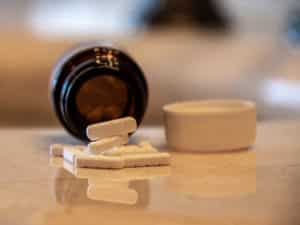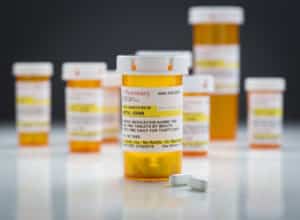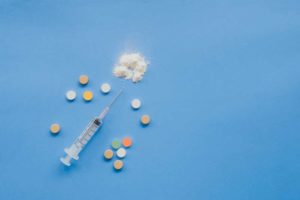Good Lord is this country ever bedeviled over North Carolina’s well-chronicled HB2 law (the bill that requires transgender people to use public toilets that correspond to the sex listed on their birth certificates).
No question it’s a significant issue and one that greatly impacts the lives of both supporters and opponents. But the mania surrounding HB2 is completely overshadowing how fearlessly North Carolina is washing the misery that prescription pill addiction presents to its citizens.
Tonight might be the night someone in the town of Nashville, a suburb of Raleigh, at the peak of his or her personal struggle with pill addiction will actually go to the local police department, even with evidence of their illegal prescription, to get support — that’s right, support — toward treatment without any legal recourse. It’s all part of the Nashville police “Hope Initiative,” the first of its kind in the state and a measure police chief Tom Bashore thinks can set the tone for combating the problem of prescription pill addiction for patients mistrusting of doctors that prescribe too soon.
“We wanted to get ahead of the problem,” Bashore told the Charlotte News Observer. “If that person comes to seek treatment, they will not be arrested. We have to eliminate the stigma and look at it the same way we view diabetes or cancer, and the need for treatment.”
The Hope Initiative launched in February of last year, 11 months before new North Carolina attorney general Josh Stein took office. By Stein’s ninth week on the job, he had a published, detailed plan in place to put tighter controls on physicians and pharmacists who hand out powerful pain-killing medicine. Stein, a Democrat, co-constructed the drug control bill with North Carolina’s Republican lawmakers.
Stein has also made appearances at, among other special-interest group gatherings, a women’s organization and a farmers bureau, and at them, he’s specifically raised concerns about opioid prescription. The hashtag opioid crisis frequently appears in his Twitter feed.
“If somebody’s crime is their illness, then everyone is better served by trying to help cure the illness than it is to put them into jail,” Stein told Asheville’s Citizen-Times.
Back here in Newport Beach at Northbound, however, wrapped up in our own hard work, we’re very pleased to monitor what’s getting accomplished in North Carolina — how prescription pill misuse is being evaluated by key leaders as more an individual human’s struggle than a vague, disposable public nuisance.
It is part of our core philosophy that addiction is not a moral failing or lack of willpower. It is a primary, progressive, chronic and potentially fatal disease centered in the brain. Oftentimes it is impacted by co-occurring mental health conditions as well as environmental factors. Addiction is a vicious cycle that is difficult to break without professional treatment. The staff at Northbound are experts in interrupting this cycle.
We’re always keeping an intense look at the symbiotic relationship between doctors that prescribe too soon and too much, and the addict. Nearly 2 percent of all U.S. opioid prescriptions, totaling an estimated 4.3 million prescriptions each year and 4 percent of all opioids by weight, are purchased by patients presumed to be “doctor shoppers,” according to a recent study.
In the first national estimate of opioid medications obtained in the United States by the doctor shoppers — patients who receive painkiller prescriptions from multiple doctors without informing the doctors of their other prescriptions — researchers found that they obtained, on average, 32 opioid prescriptions per year from 10 different prescribers.
The results are from evaluation of 146.1 million opioid prescriptions dispensed during 2008 by 76 percent of retail pharmacies. The findings were published July 2013 in the journal PLoS One.
Author
-

President, CEO & Founder at Northbound Treatment Network
Paul Alexander is the CEO, President & Founder of Northbound Treatment Network in Newport Beach, California. He believes wholeheartedly in transformational leadership, organizational health and effective, fully integrated substance use disorder and mental health treatment. With over 27 years of experience in behavioral healthcare, Paul has extensive knowledge of “in vivo” treatment modalities, clinical development, operations, strategy, marketing and financial planning. He has been widely recognized for his development of collegiate-based residential treatment programs for students in recovery and authored a research study at The University of California confirming this modality’s effectiveness.
Paul’s comprehensive professional experience, willingness to innovate, and emphasis on organizational health are vital factors in Northbound’s continued success. Paul received his Certified Addiction Treatment Specialist training at Saddleback College in Mission Viejo, CA, and was awarded Outstanding Alumni Service Award in 2002. Paul holds a Bachelor of Arts degree in Criminology, Law and Society, Summa Cum Laude, from University of California, Irvine, and a Juris Doctorate degree from Loyola Law School of Los Angeles. Paul currently serves on The National Association of Addiction Treatment Providers (NAATP) board. In addition, he serves on The Family Recovery Foundation board and The CarePossible board in Orange County; both organizations are committed to raising funds for family recovery and treatment for former military personnel. Paul is in recovery himself and lives in Orange County with his wife Silvana and his two young sons, Noah and Dean.










